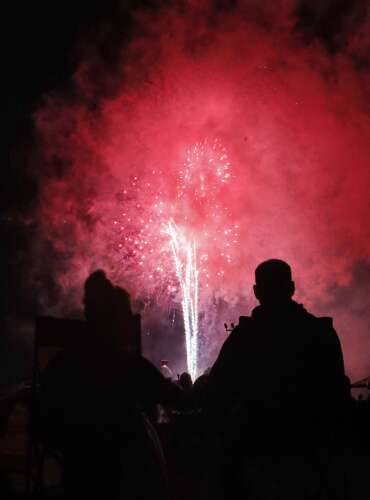In the aftermath of the hundreds of firework celebrations lighting up suburban skies this week, festive summer cheer won’t be the only thing left behind: The light shows also emit air pollution that can last hours or even days.
“(Fireworks) are beautiful, and they’re really great to look at,” said Glory Dolphin Hammes, the Chief Executive Officer of IQAir’s North American division, a Swiss-based air quality technology company. “But there’s just some complications that we need to be aware of.”
Particles from firework ingredients, namely gunpowder and chemical colorants, are known to add a significant amount of air pollution into the atmosphere, sharply decreasing local air quality. Alongside the huge concentrations of pollutants from explosives and colorant, fireworks also release pollutants from the metals and fuses that make up the firework itself.
For instance, Chicago saw a 168% increase in fine particulate matter pollution July 4 of last year.
The smoky celebrations can often push local air quality indices into the “unhealthy for all” category, in which sensitive groups such as people with cardiac and pulmonary diseases become particularly susceptible to health impacts.
“Your exposure if you’re within that particular environment will cause health effects,” Hammes said. “It will impact your ability to breathe. It also has cardiovascular health effects.”
Fireworks are a key part of July 4, but they do add to air pollution. A few preventive steps will help protect those most affected by air quality.
Daily Herald file
Depending on wind conditions, firework pollutants can linger in the air anywhere between eight to 48 hours, Hammes said, though the hours immediately following a celebration have the most potential for high pollution levels.
For those looking to enjoy the wondrous light shows but are part of a sensitive group, highly protective masks such as N95s can provide a barrier, Hammes said.
To protect indoor air quality, those who live nearby a celebration can close their windows and doors before the show starts, and leave them closed in the immediate hours afterward.
Ben Wackerlin, president of heating and cooler company Precision Today, which has an office in Carol Stream, added that indoor air quality can be improved by regularly changing A/C filters, which are critical to capturing pollutants before they make it inside.
Depending on a home’s system, filters should typically be changed every one to three months.
∙ Jenny Whidden, jwhidden@dailyherald.com, is a climate change and environment writer working with the Daily Herald through a partnership with Report For America supported by The Nature Conservancy. To help support her work with a tax-deductible donation, see dailyherald.com/rfa.
